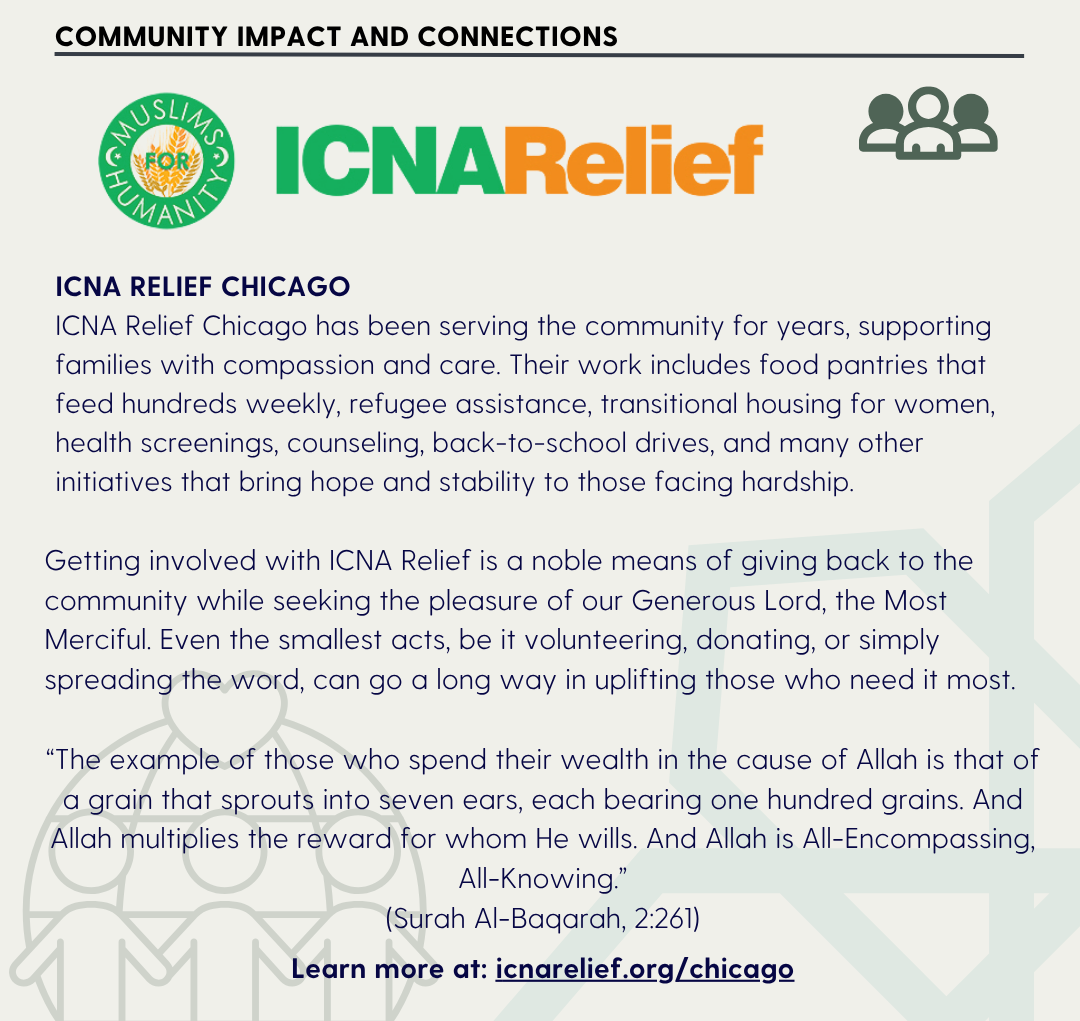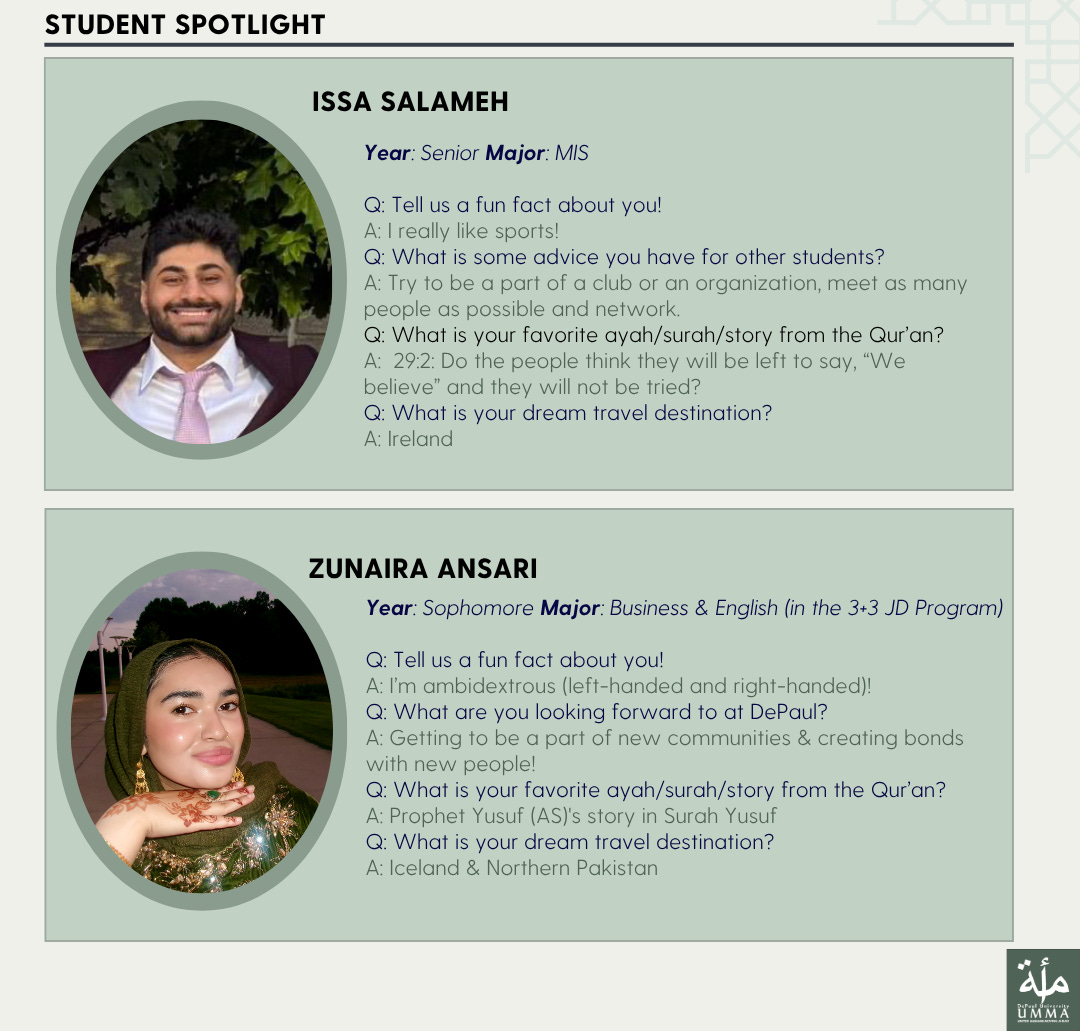Salaam alaykum UMMA family! Welcome to Week 6 and the second issue of the quarter! We hope all your midterms went smoothly and that you’re finding time to breathe a little before the next wave of assignments. Course selection for next quarter is just around the corner, so don’t forget to start planning early (reach out to your upperclassmen for advice!). We are only a few weeks away from ending the quarter, make sure to take care of yourself and stay connected with your community. May Allah make the rest of the quarter easy and grant us success in all that we do, inshAllah.
- The UMMA Ink Team
Islamic Timely Reminder
One of the realities that we as Muslims (really as humans) must come to understand is that each and every one of us is a sinner. Our Beloved Prophet Muhammad (Peace and Blessings Be Upon Him) said:
“All of the children of Adam are sinners, and the best sinners are those who repent.” (Sunan al-Tirmithi 2499)
Therefore, it follows that being a sinner is an integral and unavoidable part of our identities as humans. We must understand that Allah does not expect perfection from us; rather, He already has a creation that worships Him in a perfect manner: the angels. Allah simply expects us to try our best and to get up more times than we fall down. He expects us to be sinners who feel the weight of our sins, repent constantly, and do whatever good we can to compensate for the inevitable bad. If we find ourselves in this state of constant repentance as Muslims, we can have a level of ease knowing it will be accepted by the Most Merciful and Most Forgiving. So the choice is ours: Will we be sinners who sin with no regret? Or will we be those who turn to our Lord constantly and recognize that His Mercy is infinite!
Ayah
وَلَمَن صَبَرَ وَغَفَرَ إِنَّ ذَٰلِكَ لَمِنْ عَزْمِ ٱلْأُمُورِ ٤٣
And whoever endures patiently and forgives—surely this is a resolve to aspire to. (42:43)
Dua
اللهم طهر قلبي من كل سوء ، اللهم طهر قلبي من كل ما يبغضك، اللهم طهر قلبي من كل غلٍ وحقدٍ وحسد وكبر
Allahumma Tahhir Qalbee min kulli suu, Allahumma Tahhir Qalbee min kulli maa yubaghiDuk. Allahumma Tahhir Qalbee min kulli Ghillin wa HiQdin wa Hasadin wa kibr.
Oh Allah, clean away all forms of evil from my heart. Oh Allah, clean my heart and remove everything that displeases you. Oh Allah, clean my heart of every form of bitterness, hard feelings, and jealousy.
Hadith
حَدَّثَنِي أَحْمَدُ بْنُ إِشْكَابٍ، حَدَّثَنَا مُحَمَّدُ بْنُ فُضَيْلٍ، عَنْ عُمَارَةَ بْنِ الْقَعْقَاعِ، عَنْ أَبِي زُرْعَةَ، عَنْ أَبِي هُرَيْرَةَ ـ رضى الله عنه ـ قَالَ قَالَ النَّبِيُّ صلى الله عليه وسلم “ كَلِمَتَانِ حَبِيبَتَانِ إِلَى الرَّحْمَنِ، خَفِيفَتَانِ عَلَى اللِّسَانِ، ثَقِيلَتَانِ فِي الْمِيزَانِ سُبْحَانَ اللَّهِ وَبِحَمْدِهِ، سُبْحَانَ اللَّهِ الْعَظِيمِ”
Narrated by Abu Huraira (RA): The Prophet (ﷺ) said, “(There are) two words which are dear to the Beneficent (Allah) and very light (easy) for the tongue (to say), but very heavy in weight in the balance. They are: ‘’Subhan Allah wa-bi hamdihi’‘ and ‘’Subhan Allah Al-`Azim.”
Source: Ṣaḥīḥ al-Bukhari 7563
Current Events in the Muslim World
Hamas and Israel announce U.S.-brokered ceasefire
On October 9th, just past the two-year mark since the beginning of Israel’s genocide in Palestine, President Trump announced that Israel and Hamas had reached the first phase of a U.S.-brokered ceasefire agreement. Trump has declared the “end of Gaza war,” while Israeli prime minister Benjamin Netanyahu has not explicitly confirmed its end. Among other terms, the agreement calls for the release of Israeli hostages within 72 hours of the ceasefire taking effect; the release of nearly 2,000 Palestinian prisoners–many of whom have not been charged–from captivity; and the withdrawal of Israeli forces to a specified point. Palestinians are returning en masse to northern Gaza, although the area remains largely decimated. While Palestinians are hopeful about the ceasefire, Israel’s violation of previous agreement continues to fuel international skepticism. Trump has flown to the Middle East to address Israel’s legislature and to co-chair a summit on the ceasefire deal in Egypt with Egyptian president Abdel Fattah el-Sisi.
Government shutdown enters its third week
On October 1st, the federal government shut down due to Republican and Democratic lawmakers’ inability to agree on a funding bill. The White House’s official website, which includes a counter tracking the shutdown, states “Democrats have officially brought on a full-blown government shutdown — engineered by the Radical Left lunatics who control of their party” (sic). The shutdown is now entering its third week as Congress remains undecided on a funding plan. Essential government functions continue, though workers often go unpaid until the shutdown ends. Non-essential employees–such as workers for agencies like the CDC and National Institutes of Health (NIH), have been furloughed, or placed on unpaid leave. Additionally, federally funded services have been cut or shut down. On Friday, October 10th, the Trump administration began notifying federal employees that they would be laid off in 60 days.
At Least 15 Arrested Over “Operation Midway Blitz” Protest
On Saturday, October 11th, at least 15 people were arrested outside of the Immigration and Customs Enforcement (ICE) detention center in Broadview, Illinois. Demonstrators gathered to protest the Trump Administration’s “Operation Midway Blitz”. The operation began on September 8th, 2025, following the death of Katie Abraham, who was killed by an undocumented immigrant due to aggravated DUI incident. The Department of Homeland Security and ICE have used the case to justify intensified enforcement against undocumented immigrants across Illinois, particularly the Chicagoland area. Since September, there have been 500 arrests and one shooting of a Mexican immigrant by ICE agents. The growing frequency of ICE raids and their impacts on local communities have heightened tension during protests at the Broadview detention center. Following Saturday’s demonstration, authorities imposed a curfew on protests between 9 a.m. to 6 p.m., though groups such as the Revolutionary Black Panther Party are presenting a cease and desist to fight against it.
Khutbah Reflections
Last week’s Jumu’ah khutbah, given by UMMA’s Saad Wahab, touched on a topic that is one of the most important in our deen and in our lives: salah, or prayer.
Salah is a collection of times set by Allah for us to meet with Him so that we may momentarily detach ourselves from the dunya in order to continuously reestablish our connection with Him and ask for forgiveness. As the Prophet ﷺ mentioned in a Hadith, you would not expect to find a trace of dirt on anyone who bathed in a river five times a day. In the same way, our five daily prayers can cleanse our sins and purify our hearts, but only if they are performed with the right intention and with a mindset of continuous improvement that we should carry throughout our lives.
Saad mentioned that on the path to perfect our salah, we should first have the right intention. We should be seeking to please Allah and looking forward to meeting with Him, not hoping to impress others. Additionally, we must be purified on the outside just as we hope to be on the inside. Our wudu should be complete and purposeful, and we should try our best to meet Allah in clean garments. Within the salah, we should have khushoo’ (deep focus/concentration), which we can improve through slow, methodical movements and by understanding the meaning of what we are reciting. We should be free of distractions while we pray, and we should be careful to not distract others while they are praying.
Finally, Saad emphasized that we should strive to perform our salah on time and with consistency. Allah and His Messenger ﷺ reiterate many times the importance of the salah, especially in performing it on time and being mindful of it, including in Surah Ma’un. After all, our salah is what sets us apart from others. It will be the first thing we are asked about on the Day of Judgment, and if we work to establish our salah, it will be a light and a proof for us on that Day.
May Allah allow us to perfect our salah in the way our Prophet taught us, may He make us among those who perform our salah with purpose and consistency, and may He make it easy for us to love salah and come running to it every day. Ameen!
A Dose of Muslim History
The conversion of Omar Ibn Al-Khattab to Islam was an extremely crucial moment in Islamic history. It is said that Prophet Muhammad (pbuh) made dua to Allah, asking for either Omar or Abu Jahl to be guided to Islam. Omar was the more aggressive of the two, known for his courage and fearlessness. His sister and brother-in-law had even kept their acceptance of Islam secret from him.
Even before accepting Islam, Omar regarded Muslims as people of virtue. Once, while at the Kaaba, Prophet Muhammad (pbuh) came and began reciting Surah Al-Haqqah. Despite finding beauty in the verses, Omar said “He’s a poet.” The Prophet then recited the next verse: “And not a poet’s speech. How little is what you believe!” (69:41). Omar then thought, “He’s a soothsayer.” Yet, his thought was answered again in the next verse: “Nor is it a soothsayer’s speech. How little it is that you reflect and be mindful!” The surah captivated Omar through its calmness and eloquence, yet it still was not enough for him to accept Islam at that moment.
Some time later, Omar went toward the hills of Safa with the intention of harming the Muslims gathered there and killing the Prophet Muhammad (pbuh). On his way, he met Nuaym Ibn Abdullah, who had secretly accepted Islam. After hearing of Omar’s intent, Nuaym, seeking to delay him, told Omar that his own family members had already accepted Islam.
Omar immediately went to their house. Before entering, he heard the opening verses of Surah Taha: “Ta-Ha. We did not send down this Qur’an to you so that you may have hardship…” (Ta-Ha 20:1–2). He barged in and attacked his brother-in-law. When his sister intervened, he struck her as well. Despite the pain, she stood firm and declared, “What if you kill us? We have found true peace in the Prophet Muhammad.” Struck by her resolve, Omar asked to see the pages they were reading. His sister insisted that he performed ghusl first, and only then allowed him to read the verses. Deeply moved, he asked to be taken to the Prophet Muhammad to declare his faith.
Omar knocked on the door, entered, and proclaimed his acceptance of Islam. The takbir of the Muslims echoed loudly through the night.
Omar would later become one of the most prominent figures in early Islam, serving as the Khalifa. His leadership and character contributed greatly to the success of the Muslim community. His conversion stands as a powerful reminder that Allah’s guidance can transform even the hardest of hearts–turning a feared adversary to a revered leader.








